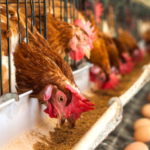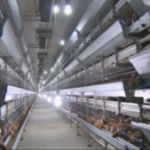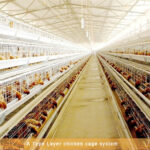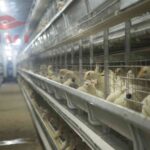The effect of vitamin C on laying hens
Farmers often add vitamins to the feed of chickens. Lack of vitamins can affect the normal growth of chickens and the laying of laying hens. Chickens lack the symptoms and control of certain vitamins. Farmers can refer to some news on our website or articles on chicken information. Based on the experience of integrated poultry equipment manufacturers and many farmers, the authors talk about the role of vitamin C in laying hens for farmers to refer to.
1. Reducing heat stress: During hot and hot seasons, laying hens are often susceptible to external high temperature stress due to their poor heat dissipation, resulting in increased body temperature, faster breathing, reduced feed intake, and lower egg production rate. Vitamin C can increase the resistance of chickens to heat stress and disease, improve the heat resistance of chickens, increase appetite, enhance ovarian metabolic function, and increase egg production rate. At a high temperature of 34 ° C, adding 200 mg of vitamin C per kilogram of diet, the egg production rate can be increased by 8%, adding vitamin C 300 mg, the egg production rate can be increased by 10%.
2. Prevention of diseases: Cold weather can lead to weakened disease resistance, low immunity, and easy to catch respiratory infections such as colds. The timely addition of vitamin C can enhance the immunity and resistance of the body to prevent and reduce the occurrence of infectious diseases.

3. Resist the cold: Chickens are warm and cold, and the most suitable temperature for laying hens is 18 to 25 ° C. When the temperature drops below 0 ° C, the eggs are significantly reduced. Low temperature in winter leads to decreased performance of chicken physique and ovary, reduced egg production and even discontinued production. When doing a good job in keeping warm and warm, and supplementing energy, protein and mineral feed, adding 300 mg of vitamin C per kilogram of diet can enhance physical fitness, increase the resistance of chicken to cold, improve and enhance ovarian metabolic function, and make it under low energy. The ovarian cells can continue to metabolize smoothly and increase the egg production rate.
4. Strong chick physique: Chickens are fed with vitamin C100mg daily, which can improve the metabolism of chickens, enhance the body’s appetite, promote growth and development, and improve survival rate.
5. Auxiliary prevention and treatment of diseases: Chickens suffering from diseases such as colds, and taking vitamin C tablets in therapeutic drugs can enhance the efficacy of the drugs, assist the chicken body to overcome the disease, and make the disease get better.
6. Strengthen the vaccine function: When the chicken is vaccinated, timely supplementation of vitamin C will further enhance the immunity of the chicken.
7. Relieve the transfer and transport stress: Feeding vitamin C 2 days before the chicken transfer or chicken transport can enhance the chicken’s anti-stress ability and reduce the death loss during transportation. It can also increase the resilience to the new environment.
8. Improve the quality of the eggshell: Adding vitamin C in the drinking water of the laying hen can increase the calcium effect in the bones, enhance the strength of the eggshell formed at night, and make the chicken hard shell eggs, reducing the egg breaking rate.
9. Prevention of chicken cockroaches: Adding proper amount of vitamin C to the feed can greatly reduce the chicken lick and accelerate wound healing.
The above is the benefit of adding vitamin C to the feed when using chicken in a chicken battery cages. I hope it can be used for your reference.











